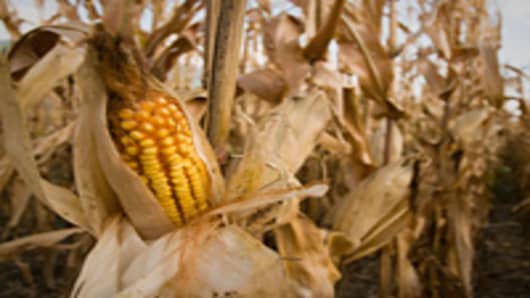Who can forget the profound desperation in Tom Joad’s heart as he and his family leave Oklahoma’s drought-stricken farms in John Steinbeck’s classic "The Grapes of Wrath?"
That dusty image — of flattened fields and beaten-down farmers — can be seen today in most counties in my state and others due to the persistent, unprecedented drought now suffocating America’s breadbasket.
The facts are stark.
In Illinois, we’ve experienced the sixth-driest growing season on record. Of 102 counties, 100 are disaster areas. The latest corn conditions show 74 percent of this year’s crop is “poor” or “very poor”, so the cost of corn products ranging from ethanol to tortillas will soar. Barren grazing pastures are forcing livestock farmers to purchase hay at inflated prices. The drought also affects fisheries, wildlife, water levels in navigable waterways and the entire food chain. (Read More: Obama Announces Measures to Soothe Drought Pain)
For the past few months, I have met with countless farmers who shared their brutal experiences. Many — particularly those with smaller family farms — are living on the edge, with little or no reserve. These businesses and people are the backbone of our economy and cannot be neglected.
So, we are extending our hands to Illinois farmers in several ways. First, to use every resource available, we’ve requested disaster relief through the United States Department of Agriculture (USDA). Farmers in USDA disaster-designated areas can seek assistance from the Farm Service Agency, including emergency loans. Those in eligible counties have eight months from the date of declaration to apply for assistance.
Second, I’ve directed our Illinois Finance Authority to partner with local banks to activate four programs to accelerate support to eligible farmers. The Agricultural Restructuring Debt Guarantee Program provides an 85 percent guarantee with a term up to 30 years on a local bank loan up to $500,000 used to consolidate existing debt and spread out payments over a longer period. The Working Capital Guarantee Program provides an 85 percent guarantee with a commitment up to three years on a local bank loan up to $250,000 used for costs related to planting crops. (Read More: Drought Could Have Silver Lining: Fund Manager)
The Agricultural Loan Participation Program provides Illinois Finance Authority purchase of up to $500,000 of a customer’s bank loan to reduce interest rates with a loan term up to 10 years. And the Rural Development Loan Program provides loans under a relending program from USDA from $50,000 to $250,000 for economic development financing in communities with less than 25,000 in population.
Finally, we’ve created a website — www.drought.illinois.gov— as a repository for information on drought conditions, water conservation measures and links to resources like our “Illinois Hay Directory”. Our Drought Response Task Force — comprised of agency officials and agricultural experts — is meeting regularly, monitoring conditions and making recommendations.
This is the power of partnerships. This is the power of people coming together to address a crushing problem.
Tom Joad’s heart was heavy, but resolute. His spirit —that when someone’s in trouble, we’ll be there to help — is a powerful and uniquely-American spirit. In this parched Summer of 2012, we are all Tom Joad.
Governor Pat Quinn (D) was sworn in as the 41st Governor of Illinois on Jan. 29, 2009. He won election to a full term on Nov. 2, 2010. Quinn has served the people of Illinois for more than 30 years as both a citizen and a public official. He has organized grassroots petition drives signed by more than 4 million voters, walked across the state in support of decent health care for all, and proposed historic tax reform for working families. He was elected Lieutenant Governor in 2002 and re-elected in 2006, serving until his succession as Governor in January 2009, and served one term as State Treasurer from 1991 to 1995. He also served as commissioner of the Cook County Board of (Property) Tax Appeals and as revenue director for the City of Chicago.
Quinn was born in Chicago and raised in Hinsdale and graduated from Northwestern University School of Law and Georgetown University School of Foreign Service. He is the father of two sons.


